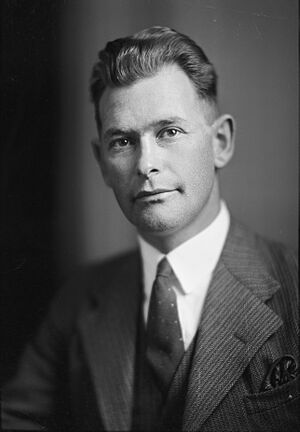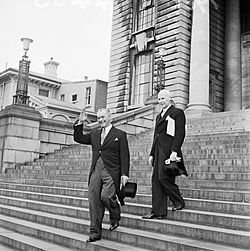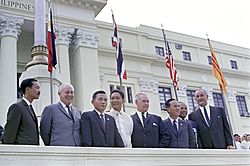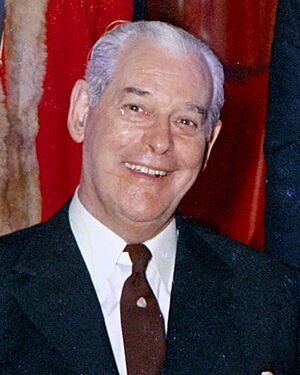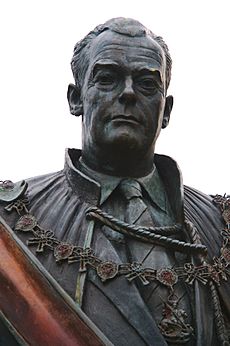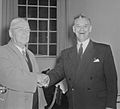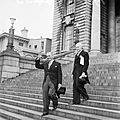Keith Holyoake facts for kids
Quick facts for kids
Keith Holyoake
|
|||||||||||||||||||||||||||||||||||
|---|---|---|---|---|---|---|---|---|---|---|---|---|---|---|---|---|---|---|---|---|---|---|---|---|---|---|---|---|---|---|---|---|---|---|---|
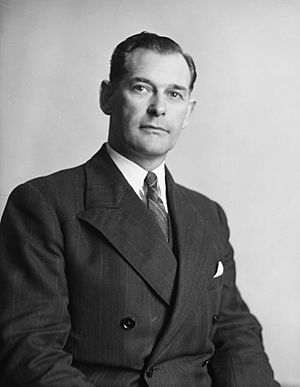
Holyoake c. 1960
|
|||||||||||||||||||||||||||||||||||
| 13th Governor-General of New Zealand | |||||||||||||||||||||||||||||||||||
| In office 26 October 1977 – 25 October 1980 |
|||||||||||||||||||||||||||||||||||
| Monarch | Elizabeth II | ||||||||||||||||||||||||||||||||||
| Prime Minister | Robert Muldoon | ||||||||||||||||||||||||||||||||||
| Preceded by | Denis Blundell | ||||||||||||||||||||||||||||||||||
| Succeeded by | David Beattie | ||||||||||||||||||||||||||||||||||
| 26th Prime Minister of New Zealand | |||||||||||||||||||||||||||||||||||
| In office 12 December 1960 – 7 February 1972 |
|||||||||||||||||||||||||||||||||||
| Monarch | Elizabeth II | ||||||||||||||||||||||||||||||||||
| Governor-General | Charles Lyttelton Bernard Fergusson Arthur Porritt |
||||||||||||||||||||||||||||||||||
| Deputy | Jack Marshall | ||||||||||||||||||||||||||||||||||
| Preceded by | Walter Nash | ||||||||||||||||||||||||||||||||||
| Succeeded by | Jack Marshall | ||||||||||||||||||||||||||||||||||
| In office 20 September 1957 – 12 December 1957 |
|||||||||||||||||||||||||||||||||||
| Monarch | Elizabeth II | ||||||||||||||||||||||||||||||||||
| Governor-General | Charles Lyttelton | ||||||||||||||||||||||||||||||||||
| Deputy | Jack Marshall | ||||||||||||||||||||||||||||||||||
| Preceded by | Sidney Holland | ||||||||||||||||||||||||||||||||||
| Succeeded by | Walter Nash | ||||||||||||||||||||||||||||||||||
| 17th Leader of the Opposition | |||||||||||||||||||||||||||||||||||
| In office 12 December 1957 – 12 December 1960 |
|||||||||||||||||||||||||||||||||||
| Prime Minister | Walter Nash | ||||||||||||||||||||||||||||||||||
| Deputy | Jack Marshall | ||||||||||||||||||||||||||||||||||
| Preceded by | Walter Nash | ||||||||||||||||||||||||||||||||||
| Succeeded by | Walter Nash | ||||||||||||||||||||||||||||||||||
|
|||||||||||||||||||||||||||||||||||
| Member of the New Zealand Parliament for Pahiatua |
|||||||||||||||||||||||||||||||||||
| In office 25 September 1943 – 10 March 1977 |
|||||||||||||||||||||||||||||||||||
| Preceded by | Alfred Ransom | ||||||||||||||||||||||||||||||||||
| Succeeded by | John Falloon | ||||||||||||||||||||||||||||||||||
| Member of the New Zealand Parliament for Motueka |
|||||||||||||||||||||||||||||||||||
| In office 1 December 1932 – 15 October 1938 |
|||||||||||||||||||||||||||||||||||
| Preceded by | George Black | ||||||||||||||||||||||||||||||||||
| Succeeded by | Jerry Skinner | ||||||||||||||||||||||||||||||||||
| Personal details | |||||||||||||||||||||||||||||||||||
| Born | 11 February 1904 Mangamutu, New Zealand |
||||||||||||||||||||||||||||||||||
| Died | 8 December 1983 (aged 79) Wellington, New Zealand |
||||||||||||||||||||||||||||||||||
| Political party | Reform National (after 1936) |
||||||||||||||||||||||||||||||||||
| Spouse |
Norma Janet Ingram
(m. 1934) |
||||||||||||||||||||||||||||||||||
| Children | 5 | ||||||||||||||||||||||||||||||||||
| Parents | Henry Victor Holyoake Esther Eves |
||||||||||||||||||||||||||||||||||
| Relatives | Ken Comber (son-in-law) | ||||||||||||||||||||||||||||||||||
Sir Keith Jacka Holyoake (11 February 1904 – 8 December 1983) was an important leader in New Zealand. He was the 26th Prime Minister of New Zealand, serving twice: first for a short time in 1957, and then from 1960 to 1972. He also became the 13th Governor-General of New Zealand from 1977 to 1980.
What makes him special is that he's the only New Zealand politician to have held both of these top jobs. People often called him Kiwi Keith, a nickname he got as a child.
Keith Holyoake grew up on a farm near Pahiatua. He left school at 12 to help his family. Before becoming a politician, he was active in farming groups. He first entered Parliament in 1932, representing the Reform Party. He helped create the National Party in 1936.
After the National Party won the election in 1949, Holyoake became a government minister. In 1954, he was named New Zealand's first Deputy Prime Minister. He became Prime Minister in 1957 when the leader, Sidney Holland, retired. After losing the election that year, he led the opposition for three years. His party returned to power in 1960, and he served as Prime Minister for over a decade.
During his time as Prime Minister, his government changed the criminal law and ended the death penalty. He also supported the United States in the Vietnam War. He led his party to win four elections in a row, which is a record. In 1972, he stepped down to let his deputy, Jack Marshall, take over.
In 1977, he was appointed Governor-General, which caused some debate because he was a former politician. He served for three years. In 1980, he received a very special honour, becoming a Knight of the Order of the Garter. He is the third longest-serving Prime Minister of New Zealand.
Contents
Growing Up in New Zealand
Keith Holyoake was born in Mangamutu, a small place near Pahiatua in the Wairarapa region. His family had a long history in New Zealand, with his great-grandparents arriving in the 1840s.
His family ran a small shop and later settled on a farm in Riwaka. Keith grew up in the Plymouth Brethren church, which meant his social life was quite strict. When he was 12, his father passed away, and Keith left school to work on the family's hop and tobacco farm. His mother, who used to be a teacher, continued to teach him at home. As he managed the farm, he got involved in local farming groups, which sparked his interest in politics.
Starting His Political Journey
The Reform Party, which was popular with farmers, chose Holyoake to run for the Motueka area in the 1931 election. He didn't win that time, but the person who did win, George Black, died the next year. Holyoake ran again in the special election in 1932 and won. At 28, he became the youngest Member of Parliament. In 1935, he received the King George V Silver Jubilee Medal.
In the 1935 election, Holyoake kept his seat. After this election, he played a big part in changing the Reform Party into the modern National Party. He quickly earned respect and was seen as a future leader. However, changes to the election boundaries meant he lost his seat in 1938 to Jerry Skinner from the Labour Party.
In 1943, Holyoake returned to Parliament as the MP for Pahiatua. By 1946, he became the National Party's deputy leader.
First Time in Government: 1949–1957
When the National Party won the 1949 election, Sidney Holland became Prime Minister. He made Holyoake the Deputy Prime Minister and Minister of Agriculture. Holyoake also served as Minister for Scientific and Industrial Research for a year and Minister of Marketing.
As Minister of Agriculture for eight years, Holyoake was known as a good and steady leader. He encouraged modern farming methods and helped control pests like rabbits. He also worked to remove government controls on how farm products were sold.
Holyoake traveled to London twice to discuss prices for New Zealand's meat and wool. In 1955, he went to a farming conference in Rome. He also visited India and the Soviet Union to find new markets for New Zealand products, though these trips didn't lead to much success.
Because he was the Deputy Leader, Holyoake often acted as Prime Minister when Holland was overseas. In 1954, he became a member of the Privy Council, a special group of advisors to the Queen.
Holyoake also partnered with a friend to buy land near Lake Taupō. They developed this land into a holiday town called Kinloch. Holyoake later said that Kinloch was one of his proudest achievements.
Becoming Prime Minister for the First Time
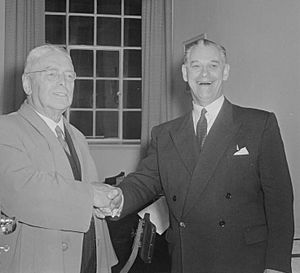
Holyoake became Prime Minister in September 1957, just two months before the election, when Sidney Holland retired due to poor health. He also became Minister of Māori Affairs. However, the 1957 election was won by the Walter Nash-led Labour Party. Holyoake then became the Leader of the Opposition for the next three years.
Leading the Country Again: 1960–1972
In the 1960 election, the National Party won, and Holyoake became Prime Minister again. Many people believe his strong campaigning helped them win, especially his criticisms of the "Black Budget" of 1958, which had raised taxes on things like petrol and cigarettes.
Key Changes During His Time as Prime Minister
Holyoake's government made many changes to government services. They created the Office of the Ombudsman, which helps people if they have problems with government departments. They also made Parliament better at checking on the government. Public broadcasting was also made more independent from direct government control.
His government updated the criminal law by passing the Crimes Act 1961. This law famously ended capital punishment (the death penalty) in New Zealand.
In 1960, the government released the "Hunn Report", which looked at the situation of Māori in New Zealand. The report showed that past governments had not done enough for Māori. Holyoake worked to address these issues. He also helped end the practice of New Zealand rugby teams being chosen based on race when touring South Africa, saying that New Zealand was "one people."
Holyoake believed in a mixed economy, where the government played a role in managing the economy to keep things stable. However, he wanted to reduce the power of trade unions. His government introduced a form of "voluntary unionism," which meant workers didn't have to join a union.
His government was easily re-elected in 1963. This period saw a long time of good economic growth for New Zealand. However, the United Kingdom's decision to join the European Economic Community (a group of European countries) was a challenge, as it affected New Zealand's trade with Britain. Holyoake's government worked to find new trade partners, including a limited free trade agreement with Australia in 1965.
Holyoake's government also had to deal with the Vietnam War. He was careful about New Zealand's involvement but supported the United States. New Zealand sent troops to Vietnam, which was a big issue in the 1966 election, which his party won.
From the mid-1960s, the New Zealand government protested against French nuclear weapons testing in the Pacific. In 1963, Holyoake announced a policy banning nuclear weapons from being stored or tested in New Zealand.
As Prime Minister during the Apollo 11 Moon landing, he sent a message that was left on the Moon.
Holyoake led his party to another win in 1969, though it was a close one. He appointed Robert Muldoon as Minister of Finance in 1967. Muldoon introduced some economic changes to deal with falling wool prices.
By the early 1970s, people wondered when Holyoake would retire. His government was seen as tired, and the party was becoming divided. His conservative views seemed out of date with a changing society. In 1972, he finally resigned to make it easier for his deputy, Jack Marshall, to take over. He stayed in the government as Minister of Foreign Affairs until his party lost the election later that year.
Life After Being Prime Minister
When the National Party lost the 1972 election, Holyoake remained an important figure in opposition. He continued to serve as the Shadow Minister of Foreign Affairs. He supported Robert Muldoon to become the new leader of the National Party. In 1975, Holyoake played an active role in the election campaign that saw National win power again under Muldoon. Muldoon then gave Holyoake a special role as Minister of State.
Becoming Governor-General
In 1977, Holyoake was surprisingly appointed Governor-General of New Zealand by Queen Elizabeth II, on the advice of Prime Minister Robert Muldoon. This decision caused some debate because Holyoake was still a government minister and a former Prime Minister. Some people felt that a former politician should not hold this non-political role.
The leader of the opposition, Bill Rowling, even said he would remove Holyoake if his party won the next election. However, Holyoake's actions as Governor-General were seen as fair and unbiased. He served for three years, which was shorter than the usual five years, because of his age. He was 73 years old when he took the role, making him the oldest Governor-General to date. His term ended in 1980.
Later Life and Family
Keith Holyoake passed away on 8 December 1983, in Wellington, at the age of 79. His state funeral was held on 13 December 1983.
He married Norma Janet Ingram twice, first in a civil ceremony in 1934 and then in their church in 1935. They had five children. His daughter Diane married another National MP, Ken Comber. In 1980, Norma, Lady Holyoake, was also honoured for her public service.
Holyoake was also known for his close friendship with Marilyn Waring, who was the youngest female MP for the National Party at the time. He cared for her deeply and supported her.
Honours and Awards
- Member of Her Majesty's Most Honourable Privy Council (PC), 1954
- Member of the Order of the Companions of Honour (CH), 1963
- Knight of the Most Venerable Order of St John of Jerusalem (KStJ)
- Knight Grand Cross of the Order of St Michael and St George (GCMG), 1970
- Companion of the Queen's Service Order (QSO)
- Knight of the Order of the Garter (KG), 1980
Images for kids
-
Holyoake (right) congratulating Walter Nash after Labour's victory in the 1957 election
-
Holyoake (fifth from the left) at a meeting of SEATO allies in Manila, Philippines in 1966.
See also
 In Spanish: Keith Holyoake para niños
In Spanish: Keith Holyoake para niños
 | Lonnie Johnson |
 | Granville Woods |
 | Lewis Howard Latimer |
 | James West |


